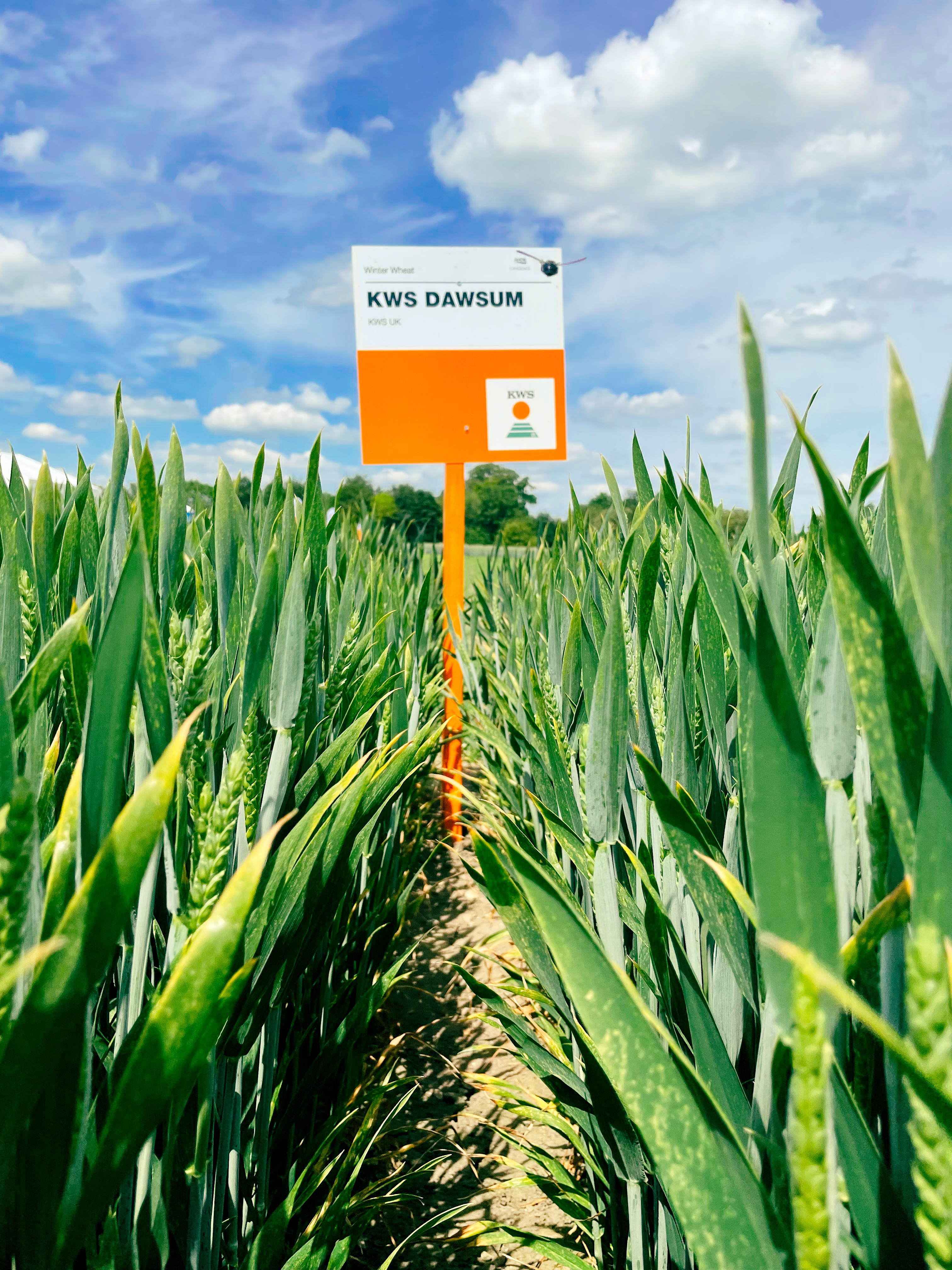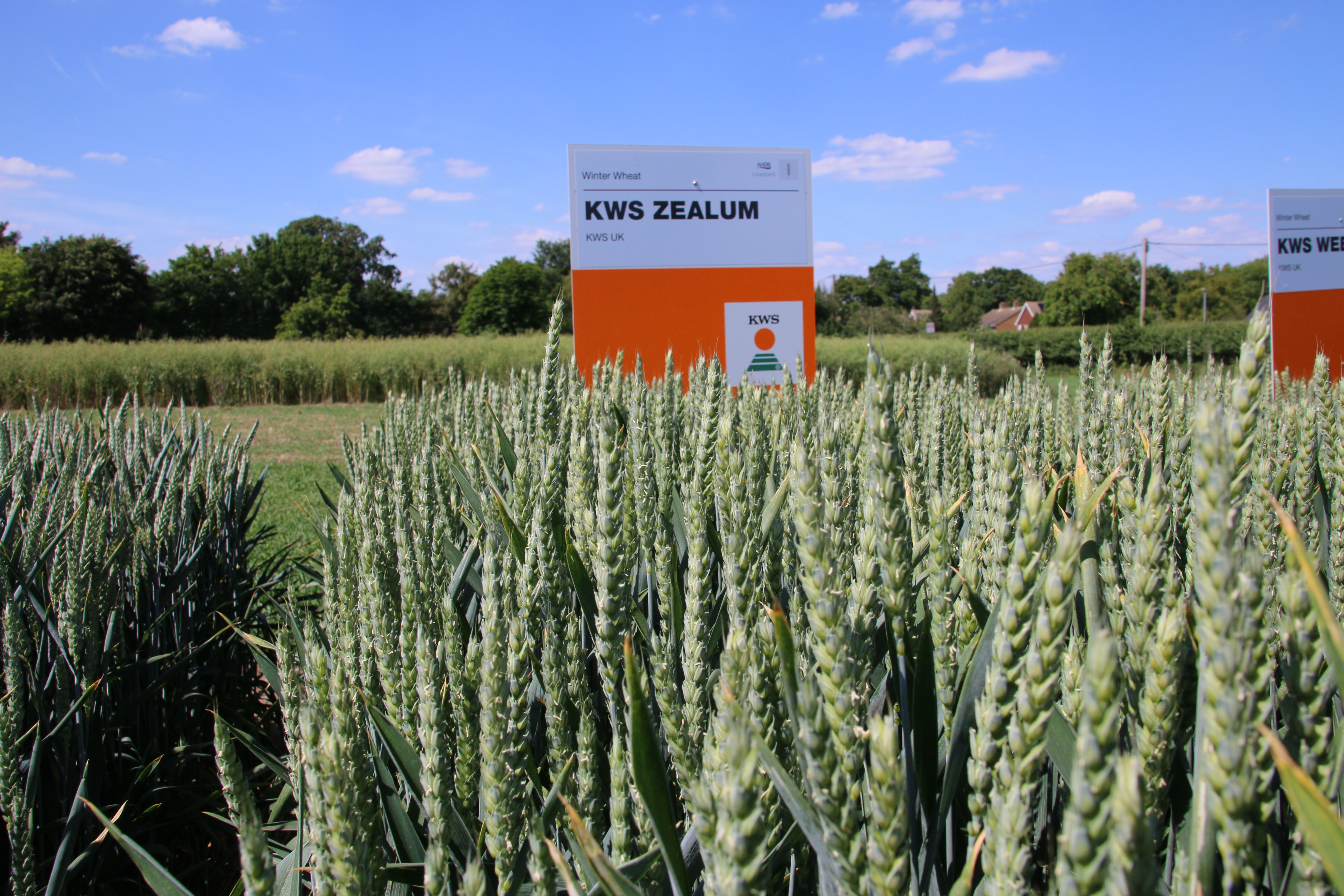New KWS varieties add strength to the Group 4 sector
Super-stiff strawed KWS Zealum adds vital diversity to Group 4 delivering exceptional performance in early sown slots combined with premium marketing opportunities, says KWS UK cereals product manager Dr Kirsty Richards.
Following in the steps of the highly successful hard Group 4 variety KWS Dawsum, KWS Zealum offers exceptional flexibility and ease of management alongside consistent high yields, she says.
“We are delighted with the reception both KWS Dawsum and now Zealum have received from the trade and growers alike.
"With strong genetics and no obvious weaknesses KWS Dawsum - a KWS Kerrin x Costello cross - is the complete package offering ultimate flexibility on farm and fantastic yields right across the rotation.
"It's delivered a stellar performance in a different growing conditions and has quickly established itself as the UK’s most popular hard Group 4, taking over 15% of the UK wheat area this season."
The reasons for its success include the ability to deliver consistently high yields across all regions of the UK and real-world flexibility which includes one of the widest sowing windows available, she believes.
"KWS Dawsum also offers a strong agronomic package and grain quality which meets and exceeds the intake requirement of the animal feed sector.
"In seasons when specific weights come under pressure and the risk for claims is high, its exceptional specific weight of 80.0kg/hl provides added security and means that the variety may also find favour in the flour milling industry.
"This will be especially important in a season like this one, where dull conditions have continued for many into June.
"An excellent Group 4 barn filler, KWS Dawsum is listed in the 2023/24 AHDB RL with a yield of 104% for the UK, rising to 105% for the North.
"But those figures only tell part of the story. The variety's early drilling yield is 107%, while in both the mainstream and late sown slots it achieves 104%.
"The variety’s lack of yield penalty when early drilled will be of real benefit on many farms, especially those in the North of England and Scotland, particularly in view of increasingly variable growing conditions.
The latest RL shows that KWS Dawsum yielding 105% of controls compared to 102% for some other popular Group 4s when drilled as second wheats, Kirsty Richards adds.
“At 95%, its untreated yield is second only to KWS Extase at 97%, with diseases resistance scores of 6.4 for Septoria and 9 for yellow rust.
“Many other high-profile winter wheats rapidly lose yield potential the later that they are sown, making KWS Dawsum’s great flexibility very unusual for such a high yielding variety."
Growers looking for a super stiff, super versatile, soft Group 4 wheat which delivers excellent performance across a wide range of challenging growing conditions and locations should have KWS Zealum on their short list, Kirsty Richards says.
"New to the market for autumn 2023 drilling, KWS Zealum is destined to quickly become a first choice for many growers in the East through to Scotland and be attractive in other parts of the UK.
"With just under 40% of the AHDB north region in soft Group 4 varieties, KWS Zealum has all the key characteristics needed for a northern wheat to perform on farm.
“It's done well in northern distilling markets thanks to consistently good spirit yield and processability in the plant. It may also be suitable for other soft wheat milling applications such as cake production or bioethanol manufacture.”
With a 10.9% protein content across all trials, a Hagberg Falling Number of 218 and a specific weight of 76.7kg/hl, KWS Zealum will also be attractive to growers in other parts of the UK, she adds.
"Most Group 4 soft wheats are grown in the east and west, ending up in the UK’s bioethanol and soft milling sectors, so the variety’s excellent overall package will also benefit growers in those regions thanks to its great combination of yellow rust resistance at 9, OWBM resistance and yield potential
"Fully approved for distilling, KWS Zealum delivers the very best performance in very early and early sown trials.
"The variety’s stiff straw, both with and without PGR, also makes it a useful contender on heavier land or more fertile soils, adding security through to harvest to the soft Group 4 sector.
One of the main reasons for supporting KWS Zealum is that it brings additional genetic diversity to the soft wheat sector, which is dominated by Cougar crosses.
According to Laura Beaty, Seed Grain Director for Berwick-upon-Tweed-based McCreath Simpson & Prentice, new varieties are always welcome in the soft Group 4 market.
“The area we serve, from the Highlands of Scotland to North Yorkshire, is largely a soft distilling market and represents about 400,000 tonnes of annual demand, so KWS Zealum is a significant variety for us.
“One of the main reasons for supporting KWS Zealum is that it brings additional genetic diversity to the soft wheat sector, which is dominated by Cougar crosses.
"High levels of Septoria during the 2020/21 growing season had a significant effect on varieties with Cougar in their parentage and created concern about a breakdown of resistance, so it is good to have other, genetically diverse alternatives available.
"KWS Zealum's treated yield at 103% is on a par with cougar-based LG Skyscraper, which is the market leader for this sector in Scotland.
“KWS Jackal (99%) and Elation (100%) remain in this category, but we see KWS Zealum being a natural successor as growers migrate away from these older varieties.
"It could also replace KWS Barrel, a high yielding soft Group 3 which is no longer on the Recommended List but still grown for feed north of the Border."
KWS Zealum will chip away at LG Skyscraper’s dominance and help to reduce growers’ risks as its strong all-round disease package combined with very good yields makes it an attractive option, she believes.
“Early sowing is a big thing in the North of England and Scotland, with some growers wanting to drill as early as the end of August.
"Although we encourage them to hold off at least until September, KWS Zealum certainly ticks the early-drilling box but also has a wide range of other attributes including distilling potential."
Simple to grow
In McCreath Simpson & Prentice trials, KWS Zealum looks 'very smart' and visitors immediately noticing it is very clean with a nice prostrate habit, she points out.
"Increasingly, growers are looking for varieties which are more forgiving, both in terms of management and cost. KWS Zealum achieves both objectives, its suitability for early drilling and long sowing window offering plenty of options.
“Last year’s very dry spring and lack of rain made everyone nervous about what harvest would bring, but grain prices were high and ultimately most growers achieved good returns.
"This season is entirely different in terms of the weather and disease risks. Although yields should be good, higher input prices and lower grain prices are causing concern.
"There is also a question mark over whether quality can be retained should wet weather persist.
“KWS Zealum offers a strong package of disease resistance which provides greater flexibility when it comes to inputs.
"In areas of high rainfall and humidity, or seasons such as this when eyespot is prevalent, its good disease resistance, short, stiff straw and resistance to sprouting will be significant considerations.
KWS Dawsum is a variety which sells itself and being an excellent all-rounder is widely requested by our farmer customers, Laura Beaty says.
"Although much of MSP’s market is for soft milling varieties, some growers want to produce hard feed wheat and KWS Dawsum fits the bill exactly.
"It offers an excellent overall package, from consistently high yields and quality to excellent flexibility in terms of sowing dates
“Within MSP we use a traffic light system to assess all varieties across a range of criteria and KWS Dawsum is the only hard Group 4 which ticks every box.”
KWS Zealum full of promise on Borders farm
In the heart of the Scottish Borders, close to the market town of Kelso, David Fuller-Shapcott is growing 16ha of KWS Zealum on a seed contract for McCreath Simpson & Prentice.
With four generations of farming experience, the award-winning business produces consistent, high-quality crops for known markets, while always looking for opportunities to further improve what they do and how they do it, he says.
“I like KWS wheats as they have big, bold grains and the significant benefit of not having Cougar in their lineage.
"In addition to the Group 3 variety KWS Brium, we have grown KWS Basset for many years.
"Although KWS Basset is no longer on the AHDB Recommended List, it has been a staple variety which clearly suits the farm, having produced up to 19.75t/ha in a 2018 Yield Enhancement Network (YEN) trial.
"Local market demand and the availability of some interesting premium contracts for soft wheats for distilling in Scotland through Simpsons Malt have led us to look increasingly at this sector.
"KWS Zealum came along as an alternative to KWS Basset and the variety’s very stiff straw gives excellent standing power, a very attractive asset when really pushing a crop.
"This season we have 100ha of winter wheat, including 16ha of KWS Zealum. Because it is a seed crop for McCreath Simpson Prentice, we're growing it in an ‘easy’ field which is situated ninety metres above sea level."
One of the difficulties of farming in this location is that the weather window closes very rapidly, so the first week of October is the latest that David likes to drill, with a cut-off time of mid-October.
"The KWS Zealum was sown on 11th October into land which had been min tilled using the farm’s power harrow-drill combination and a seed rate of 240kg/ha, the seed being coated with Syngenta’s Vibrance Duo to help promote rooting."
Anticipated yield/ha 'in the teens'
The crop emerged very quickly and has looked good ever since, he says.
“We farm predominately heavy clay loam soils of the Whitsome association, which is technically described as having ‘impeded natural drainage,’ which is to say that it does not dry out very fast.
“Almost all the fields have extensive under-drainage which requires vital regular maintenance, especially following wet years.
"Almost all soils at Sweethope Farm have a high magnesium content and are difficult to manage but ideal in dry conditions as they retain water.
"Trying to stay ahead of the game in terms of future legislative requirements and market demands, we have implemented a declining Nitrogen curve policy to a maximum of 160kgN/ha applied in liquid form and split 40:60:60.
"In the current Nitrogen climate, being able to grow a 10t/ha crop on just 160kg/t is a good achievement I think."
Due to the cold, late spring it was April before the first Nitrogen went on and no T0 fungicide was used, representing a considerable cost saving, he points out.
"None of the winter wheats received an autumn herbicide, but a ‘beefy herbicide’ comprising Iodosulfuron, Mesosulfuron and Thiencarbazone was applied in early May to clean up any grassweeds and cleavers.
"By the end of May, the KWS Zealum had not received a fungicide or a PGR and the crop was looking clean and healthy.
"We're happy with progress to date and will be looking for the crop to produce a per-hectare yield ‘in the teens.’"
Your consultants



